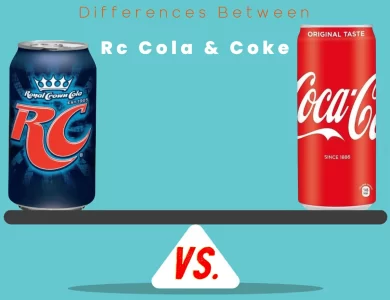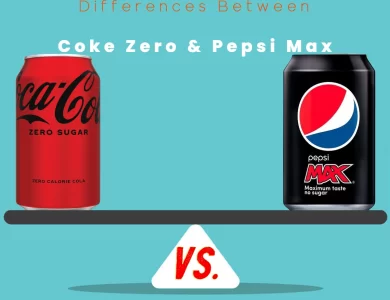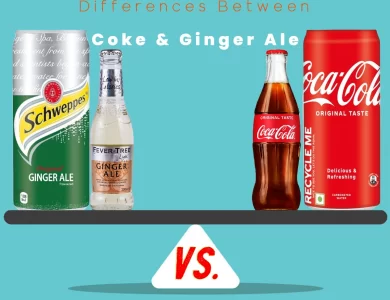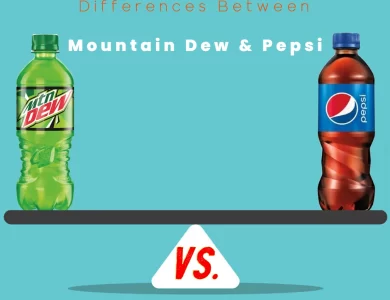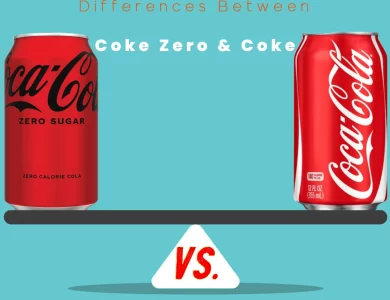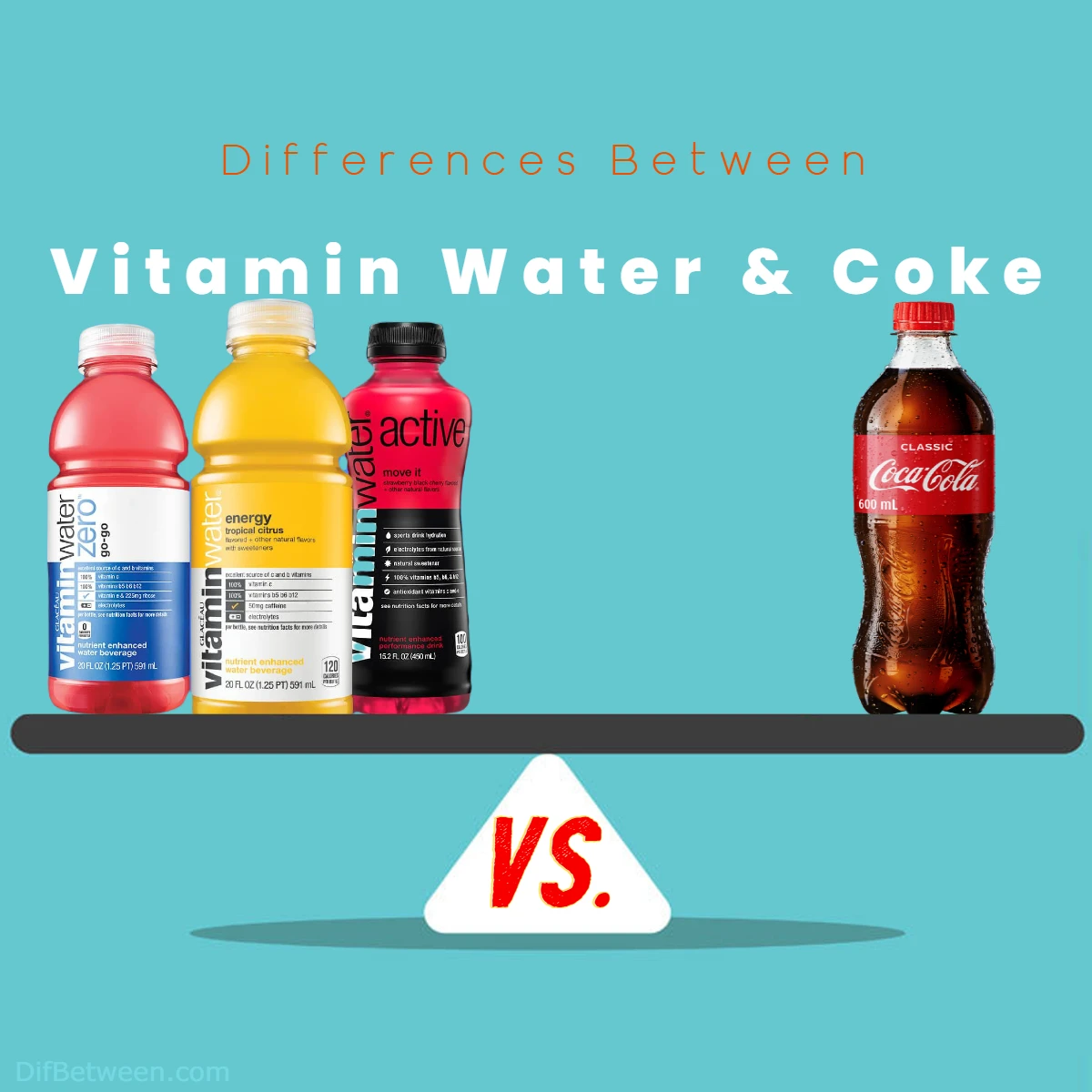
| Aspect | Vitamin Water | Coke |
|---|---|---|
| Composition | Flavored water with added vitamins and minerals | Carbonated soft drink with cola flavor |
| Ingredients | Purified water, flavors, sweeteners, vitamins, minerals | Carbonated water, high-fructose corn syrup/sugar, caramel color, phosphoric acid, natural flavors, caffeine |
| Nutritional Value | Provides added vitamins and minerals | High in added sugars, no significant vitamins/minerals |
| Hydration | Contains water, may include electrolytes | Contains water, but diuretic effects due to caffeine and sugar content |
| Impact on Health | Can have high sugar content depending on flavor | High sugar content linked to obesity, diabetes, heart disease, tooth decay |
| Flavor Variety | Wide range of fruit-infused and unique flavors | Variety of flavors including classic, diet, and cherry variations |
| Packaging | Plastic bottles for portability and durability | Cans, glass bottles, and plastic bottles |
| Marketing | Emphasizes added nutrients and potential health benefits | Focused on positive emotions and fun experiences |
| Availability | Widely available in supermarkets and convenience stores | Global distribution in stores and entertainment venues |
| Price Range | Varies depending on size and promotions | Varies depending on packaging and location |
| Caffeine Content | Typically caffeine-free | Contains caffeine, 34 mg per 12-oz can |
| Dietary Considerations | Some flavors may have reduced sugar or zero-calorie sweeteners | Diet versions available with reduced sugar or zero-calorie sweeteners |
Differences Between Vitamin Water and Coke
Composition and Ingredients
Vitamin Water: Vitamin Water is a flavored water drink that contains added vitamins, minerals, and sometimes electrolytes. It is typically made by combining purified water, natural or artificial flavors, sweeteners, and a blend of vitamins and minerals. The specific combination of ingredients varies depending on the flavor, but some common additions include vitamin C, B vitamins, and electrolytes like potassium and magnesium.
Coke: On the other hand, Coke, short for Coca-Cola, is a carbonated soft drink renowned for its signature cola flavor. Its main ingredients include carbonated water, high-fructose corn syrup (or sugar, depending on the variation), caramel color, phosphoric acid, natural flavors, and caffeine. Coke does not contain significant amounts of vitamins or minerals, focusing more on providing a sweet and fizzy taste.
Nutritional Value
Vitamin Water: Vitamin Water is marketed as a fortified beverage, aiming to provide additional nutrients along with hydration. Depending on the specific flavor, it can offer various amounts of vitamins, such as vitamin C, B vitamins (including B6 and B12), and vitamin E. However, it’s essential to note that the actual vitamin content can vary between flavors, so reading the nutrition label is important to determine the specific nutrients present in each bottle.
Coke: In terms of nutritional value, Coke falls more into the category of a sugary beverage. It contains a significant amount of added sugars, usually in the form of high-fructose corn syrup or sugar. A regular 12-ounce (355 ml) can of Coke can contain approximately 39 grams of sugar, which exceeds the recommended daily limit for added sugar intake. While Coke does provide some energy from the sugar content, it does not offer any significant vitamins or minerals.
Caffeine Content: Vitamin Water vs Coke
Vitamin Water: Most flavors of Vitamin Water do not contain caffeine. Vitamin Water is primarily marketed as a refreshing, hydrating beverage that provides added vitamins and minerals. It’s a popular choice for those who prefer a non-caffeinated drink but still want a flavorful and nutrient-enriched beverage option.
Coke: Coke, on the other hand, does contain caffeine. The caffeine content in Coke varies depending on the specific product and serving size. A regular 12-ounce (355 ml) can of Coke typically contains 34 milligrams of caffeine. However, it’s important to note that caffeine content may differ among Coke variations, such as Diet Coke or Coke Zero, which may have different formulations.
Effects on Hydration
Vitamin Water: Vitamin Water, being a flavored water-based drink, can contribute to your overall hydration. It contains water as its primary ingredient, which helps replenish fluid levels in the body. Additionally, some Vitamin Water variations may contain electrolytes like potassium and magnesium, which are essential for maintaining proper hydration and supporting muscle function. However, it’s important to note that the sugar content in certain flavors of Vitamin Water can potentially diminish its hydrating effects, as excessive sugar intake may cause temporary diuretic effects.
Coke: While Coke contains water as its main ingredient, the carbonation and high sugar content can have a different effect on hydration. The diuretic properties of caffeine and the high sugar content may actually increase the need for fluids in the body, potentially offsetting the hydrating effects of the water present in the beverage. Regular consumption of sugary drinks like Coke without sufficient water intake can lead to dehydration over time.
Impact on Health
Vitamin Water: Vitamin Water is often marketed as a healthier alternative to regular soft drinks, emphasizing its added vitamins and potential health benefits. However, it’s essential to approach these claims with caution. While the added vitamins in Vitamin Water can be beneficial, it’s important to consider the overall nutritional profile and sugar content. Some flavors of Vitamin Water may contain high amounts of added sugars, which can contribute to weight gain, tooth decay, and other health issues when consumed in excess.
Coke: Coke, as a carbonated soft drink, is widely recognized for its high sugar content. Regularly consuming sugary drinks like Coke has been linked to an increased risk of obesity, type 2 diabetes, heart disease, and tooth decay. The empty calories from the added sugars in Coke can also displace nutrient-rich foods in the diet, leading to potential nutritional deficiencies. It’s important to moderate your consumption of Coke and be aware of its impact on your overall health.
Flavor Variety
Vitamin Water: One of the notable aspects of Vitamin Water is the wide array of flavors available. From fruit-infused options like Tropical Citrus and Acai-Blueberry-Pomegranate to more unique combinations like Dragonfruit, Vitamin Water offers a diverse range of tastes to suit various preferences. Whether you enjoy sweet, tangy, or refreshing flavors, there’s likely a Vitamin Water flavor that caters to your taste buds.
Coke: While Coke primarily focuses on its classic cola flavor, it also offers variations like Diet Coke, Coke Zero, and Cherry Coke, catering to different dietary preferences and taste preferences. These variations aim to provide alternatives with reduced sugar or calorie content while still offering the familiar Coke taste. Whether you prefer the original flavor or a twist on it, Coke has options to satisfy different palates.
Packaging and Portability
Vitamin Water: Vitamin Water is typically sold in plastic bottles, ranging from small sizes like 500 ml to larger bottles of 1 liter or more. The bottles are designed to be portable, making it easy to carry them with you on the go. The plastic material is lightweight and durable, ensuring that the beverage remains sealed and intact until you’re ready to enjoy it.
Coke: Coke is available in various packaging options, including cans, glass bottles, and plastic bottles. Cans are a popular choice for convenience and portability, while glass bottles often offer a nostalgic appeal. Plastic bottles are commonly used for larger quantities and are lightweight for easy transportation. The packaging options for Coke cater to different preferences and situations, allowing you to choose the most suitable one for your needs.
Marketing and Branding
Vitamin Water: Vitamin Water has positioned itself as a beverage that combines hydration with added vitamins and minerals. Its marketing campaigns often highlight the potential health benefits of consuming their product, promoting it as a smarter choice compared to regular soft drinks. The brand aims to appeal to health-conscious individuals who are seeking a refreshing drink with added nutritional value.
Coke: Coke is a globally recognized brand that has built a strong reputation over the years. Its marketing efforts focus on evoking positive emotions, fun experiences, and a sense of togetherness. Coke’s iconic advertisements often feature memorable jingles, uplifting messages, and captivating visuals. The brand’s widespread popularity and cultural impact have made it a staple in the soft drink industry.
Availability and Accessibility
Vitamin Water: Vitamin Water is widely available in supermarkets, convenience stores, and beverage vending machines. Its popularity has led to increased accessibility, making it easy to find in many locations. However, the flavor selection may vary depending on the store, with some carrying a broader range of flavors compared to others.
Coke: Coke is one of the most widely distributed beverages globally. You can find it in almost every corner of the world, from small neighborhood stores to large supermarket chains, restaurants, and entertainment venues. The extensive availability of Coke makes it easily accessible, ensuring that you can quench your cola cravings wherever you may be.
Price Range
Vitamin Water: The price of Vitamin Water can vary depending on the size of the bottle and the location of purchase. Generally, it falls within the range of other bottled beverages, with larger sizes being more cost-effective per ounce. Keep in mind that prices may also differ based on promotions, discounts, or regional factors.
Coke: Similar to Vitamin Water, the price of Coke varies depending on the packaging size and location. Cans and smaller bottles are often priced lower, making them more affordable for individual consumption. Larger bottles or multipacks may offer better value for money if you consume Coke regularly or share it with others.
Dietary Considerations
Vitamin Water: Vitamin Water offers a range of options, including some with reduced sugar or zero-calorie sweeteners. This variety allows individuals who are watching their sugar intake or following specific dietary plans to find a flavor that suits their needs. However, it’s important to read the nutrition label and ingredients list to ensure that the chosen flavor aligns with your dietary restrictions or preferences.
Coke: Coke offers variations like Diet Coke and Coke Zero, which are specifically formulated with reduced or zero-calorie sweeteners. These options cater to individuals who are conscious of their sugar or calorie intake but still want to enjoy the taste of Coke. However, it’s important to note that these diet versions may contain artificial sweeteners, and individuals with certain health conditions or sensitivities should consider consulting their healthcare provider before consuming them.
Vitamin Water or Coke: Which One Should You Choose?
Vitamin Water and Coke are two popular beverage options, each with its own unique characteristics and appeal. So, when it comes to choosing between the two, which one should you go for? The answer ultimately depends on your personal preferences, health goals, and the specific qualities you’re seeking in a drink.
- If you’re looking for a beverage that offers hydration along with added vitamins and minerals, Vitamin Water might be the better choice for you. With its range of flavors and nutrient-enriched composition, Vitamin Water aims to provide a refreshing and hydrating experience while offering additional nutritional benefits. It can be a great option for those who want to replenish their fluids while enjoying a flavorful drink.
- On the other hand, if you’re craving the classic cola taste and prefer a fizzy and indulgent beverage, Coke may be the go-to option. Coke is known for its distinctive flavor and widespread popularity. It’s a beverage that’s often associated with enjoyment, social gatherings, and nostalgic moments. However, it’s important to note that Coke is high in added sugars, which can have negative health effects if consumed excessively.
- When making your decision, consider your overall health goals and moderation. If you’re watching your sugar intake, looking for a caffeine-free option, or seeking a beverage with added nutrients, Vitamin Water may be a more suitable choice. On the other hand, if you’re treating yourself to an occasional indulgence or simply enjoy the taste of Coke, you can enjoy it in moderation as part of a balanced lifestyle.
Remember, staying hydrated is essential, and water should always be your primary choice for hydration. If you’re looking for flavor and variety without the added sugars and calories, consider infusing your water with fresh fruits or herbs. Ultimately, it’s about finding a balance that works for you and aligns with your preferences and health goals.
So, whether you opt for the nutrient-enhanced refreshment of Vitamin Water or the classic cola experience of Coke, the choice is yours! Just remember to enjoy these beverages in moderation and prioritize your overall health and well-being.
Cheers to making informed choices and staying refreshed!
FAQs
Vitamin Water is often marketed as a healthier alternative to Coke due to its added vitamins and minerals. However, it’s important to consider the overall nutritional content and sugar levels. While Vitamin Water provides additional nutrients, some flavors may still contain high amounts of added sugars. On the other hand, Coke is high in sugar and offers no significant vitamins or minerals. Moderation is key when consuming either beverage.
Most flavors of Vitamin Water are caffeine-free. Vitamin Water primarily focuses on hydration and added nutrients rather than stimulants like caffeine. However, it’s always a good idea to check the specific flavor’s ingredients and nutrition label to ensure there are no caffeine-containing additives.
Coke contains water as its main ingredient, which can contribute to hydration. However, the carbonation and high sugar content in Coke may have a diuretic effect and increase the need for fluids. Vitamin Water, on the other hand, is specifically formulated for hydration and may contain electrolytes that support proper hydration.
Vitamin Water offers a wide range of flavors, including fruit-infused options like Tropical Citrus and Acai-Blueberry-Pomegranate. It provides diverse taste experiences to cater to different preferences. While Coke is primarily known for its classic cola flavor, it also offers variations like Diet Coke, Coke Zero, and Cherry Coke, expanding the range of options to suit different taste buds.
If you’re watching your sugar intake, it’s important to be mindful of the flavor and nutritional content. Some Vitamin Water flavors may contain high amounts of added sugars, so opting for varieties with reduced sugar or zero-calorie sweeteners can be a better choice. Similarly, Coke offers diet versions with reduced or zero-calorie sweeteners, which can be an option for those looking to limit sugar consumption. Always check the nutrition labels for specific information.
Coke offers caffeine-free options such as Caffeine-Free Coke and Caffeine-Free Diet Coke. These variants provide the same cola flavor without the added caffeine content. If you’re sensitive to caffeine or prefer to avoid it, these caffeine-free options can be suitable alternatives.
Read More:
Contents
